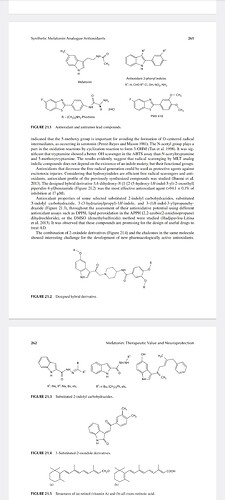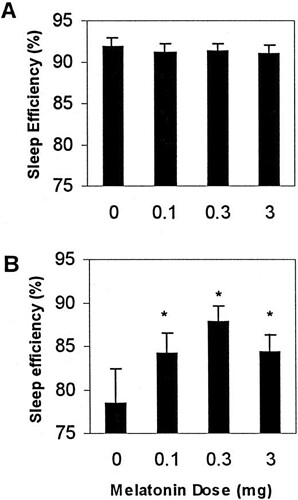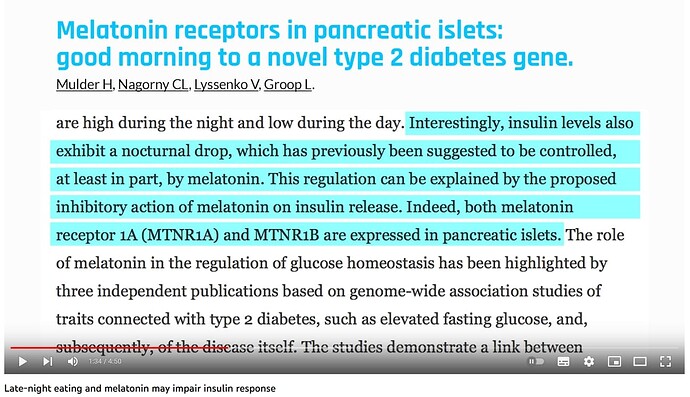The physiologic melatonin dose (0.3 mg) restored sleep efficiency (P < 0.0001), acting principally in the midthird of the night; it also elevated plasma melatonin levels (P < 0.0008) to normal. The pharmacologic dose (3.0 mg), like the lowest dose (0.1 mg), also improved sleep; however, it induced hypothermia and caused plasma melatonin to remain elevated into the daylight hours.
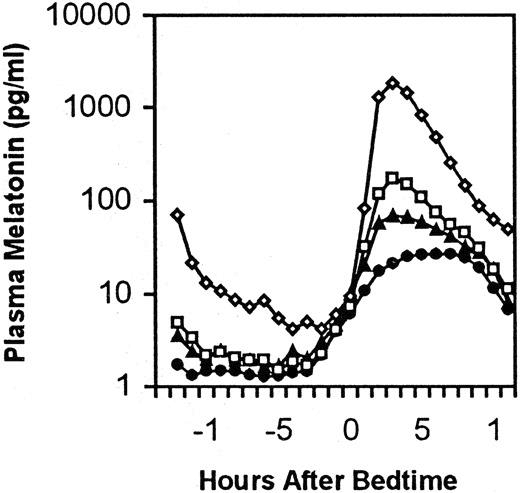
3 mg do not return to same levels as placebo.
I don’t think high dose melatonin will improve sleep, except placebo of course, it will probably harm sleep. With constant circulating melatonin how is it going to function to signal night-time & day-time?
Inhibition of insulin release:
Some mechanistic data suggests melatonin may inhibit insulin production, which would increase blood glucose, looking for studies rn…
First, several genome-wide associations studies (GWAS) have reported, that the frequent rs10830963 single-nucleotide polymorphism, located in the melatonin receptor 2 gene (MTNR1B), which may be a gain-of-function variant, is strongly associated with elevated fasting glucose and risk of type 2 diabetes.4-8 Second, acute daytime administration of melatonin results in 10%–25% decreased insulin sensitivity.9-11 On the other hand, carriers of rare loss-of-function variants in the MTNR1B and individuals with low nightly melatonin secretion have increased risk of type 2 diabetes.12, 13 As the use of melatonin is increasing as a sleep aid in both adults14 and children,15 it is advantageous to clarify the metabolic effects of long-term melatonin treatment on glucose metabolism. A number of placebo-controlled randomized studies have addressed this question, but the outcomes have been limited to glycated hemoglobin (HbA1c) levels, fasting plasma glucose and insulin levels, mostly with beneficial effects.16 We recently performed a systematic review and meta-analysis of the metabolic consequences of melatonin treatment in healthy individuals and patients with metabolic diseases and found no effects of treatment on fasting plasma glucose, but reduced fasting insulin levels and a tendency towards increased insulin sensitivity measured by homeostatic model assessment for insulin resistance (HOMA-IR).16 However, none of the previous long-term placebo-controlled randomized studies stratified on rs10830963 genotype and none of the studies evaluated the metabolic effects of melatonin treatment beyond fasting glucose and insulin levels. Thus, a comprehensive assessment of the metabolic effects of melatonin treatment with direct measurements of insulin sensitivity and β-cell function in patients with type 2 diabetes stratified on rs10830963 genotype is warranted.
In our study, the treatment of male patients with type 2 diabetes with 10 mg of melatonin for 3 months before bedtime reduces insulin sensitivity
Very small sample size: "Our current study is limited by the relatively small sample size that restricts conclusions drawn from the genotype-specific analyses, "
All of the subjects already had type II diabetes. All of the subjects were overweight.
Participants had a BMI (kg/m2) of 29 ± 3.5, putting them in the overweight to obese range.
If your BMI is 25.0 to 29.9, it falls within the overweight range. If your BMI is 30.0 or higher, it falls within the obese range.
The subjects were already type II diabetics.
Millions of people have been taking what is high-dose melatonin in the U.S, because that is what is on offer at places like Walmart. If there was a significant danger of developing lower insulin sensitivity or development of type II diabetes, it surely would have been noticed by now.
I have been taking high-dose melatonin for over 40 years and I am not even pre-diabetic.
I don’t know how long John Hemming has been taking high-dose melatonin but he is not diabetic either.
I don’t know why they don’t read the literature before doing these poorly thought-out studies.
Read this paper it is a much more thorough review of the safety of melatonin.
“Safety of higher doses of melatonin in adults: A systematic review and meta-analysis”
https://onlinelibrary.wiley.com/doi/full/10.1111/jpi.12782
I think taking melatonin that has an effect before initial sleep is a bad idea. Time release may be ok.
John, does melatonin ever make you drowsy in a consequential way? Excluding events where you use it to ameliorate alcohol consumption.
I tried taking 5mg in the middle of the night. Was notably sleepy the next day. N=1 of course. I’m having a hard time imagining taking hundreds of mg and not having an adverse effect on the following day.
I don’t think they reported blood glucose / insulin levels as adverse events, if they even measured it.
Any adverse event from slightly higher blood glucose levels will take a long time to occur if it happens.
I think high dose melatonin doesn’t work for me.
Also adverse events might not be reported:
Importantly, we found that ≥10 mg doses of melatonin increase the likelihood of AEs and that there was marked variability in the quality of safety data collection and reporting in the trials conducted to date. This may indeed reflect the general opinion of the overall safety of melatonin leading to less stringent collection and/or reporting of AEs.
Same, personally I get drowsy the next day, the few times I tested a higher dose, 0.3 mg I can barely feel except I think my sleep is just better. It probably differs between people. I use electronic devices (I block blue light though) near bedtime so I naturally don’t have much melatonin. It was a longer time ago I tried higher dose melatonin, so maybe it works differently now. I have an Oura ring so I could try a self-blinded experiment.
Same here when I tried Melatonin during the night. On a side note what helps me getting back to sleep is 1g Taurine
It is very rare that i am drowsy from melatonin and not in a consequential way, but i start with bad insomnia. We cannot assume everyone has precisely the same metabolism. I took some time getting my dosing level up.
Hey Alex! Any information on Melatonin and Adderall Neurotoxicity? Im on Vyvanse for ADHD and I’d like to counteract the dangers of long term use of that medication as well.
“I don’t think they reported blood glucose / insulin levels as adverse events, if they even measured it.”
I find melatonin pushes blood glucose down initially. I dont know of any longer term effects but my hba1c has been as low as 4.18% so i dont think therexis an issue for me.
Yes, something to look out for if using high dose melatonin, and drowsy side effects, worse sleep than lower dosages. That might all be worth it for some benefits to health, however. And it would be good if drowsiness decreases over time while using.
I think the key thing is the interplay between melatonin and cortisol. It is quite possible that the reason some people have drowsiness is a reduction in cortisol. Melatonin is GABAergic, but its serum half life is really short. The paper I linked to recently said 10 minutes, but normally the figure of 30 minutes is used.
There is, however, clearly a complex dance between melatonin and cortisol levels and if someone goes into a day with insufficient cortisol they might feel drowsy.
I started on analysing cellular health because I had awful insomnia. Hence I come from that direction. Also as a regular heavy drinker (although not so much these days) my body has probably adjusted to have a more rapid metabolism of ethanol into acetaldehyde.
Before I took my most recently dose of rapamycin, however, I was handling sleep reasonably well and getting (with the assistance of melatonin normally) up to seven hours of actual sleep. Autophagy, however, is known for disrupting circadian proteins and the last couple of times I took rapamycin at 2mg I had disrupted sleep. I get disrupted sleep from other aspects of autophagy as well. Expecting disrupted sleep I did a few things which I though might assist with autophagy which I thought would also disrupt sleep (not that I wanted it, but in for a penny in for a pound). Hence after taking 4mg of rapamycin I have had a few days of disrupted sleep. Yesterday was the equivalent of a dose of 1.3mg (assuming a 60 hour half life) and my sleep was better. Today is the equivalent of a dose of 1mg (being two half lives since Day 1).
At the study I posted earlier, 3 mg melatonin reduced sleep efficiency compared to 0.3 mg, it peaked at 0.3. I don’t know how it looks at higher dosages, it isn’t totally out of the realm of possibility that sleep efficiency reduces at even higher dosages of melatonin, but that would be something I’d have to research. I don’t think it’s possible to extrapolate from this graph. Note Y axis truncated.
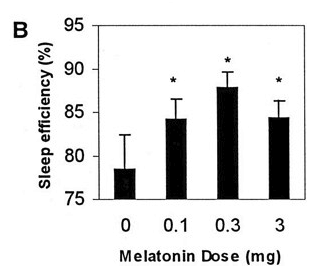
The problem with this research is that the melatonin is taken before going to bed. My issue was duration of sleep for which melatonin before bed (unless time release) is pretty useless.
In fact most time release melatonin releases too quickly.
What a lot of people miss is the physics of the pineal gland. A material amount (maybe all) of the melatonin generated by the pineal gland goes directly into the third ventrical of the CSF. Some may also go directly into serum, but when we measure serum levels we are measuring at least in part if not all the melatonin that has come out of the CSF having previously gone in potentially some hours earlier.
I’ve been taking 120 mg of melatonin for about 9 months now. I only take it when I wake in the night to use the bathroom (usually between 1-3am).
I never feel groggy but then again, I usually get a spike of cortisol just before I wake. I am probably an outlier as I cannot drink coffee without feeling buzzed.
My guess is that the groggyness that some people get is not the presence of Melatonin, but the absence of Cortisol or something. The may be caused by exogenous Melatonin, but Melatonin has such a short half life it is unlikely to be melatonin itself.
Are there any melatonin analogues that don’t induce drowsiness?
I am not sure there is an analogue that is as good to prevent oxidative stress.
